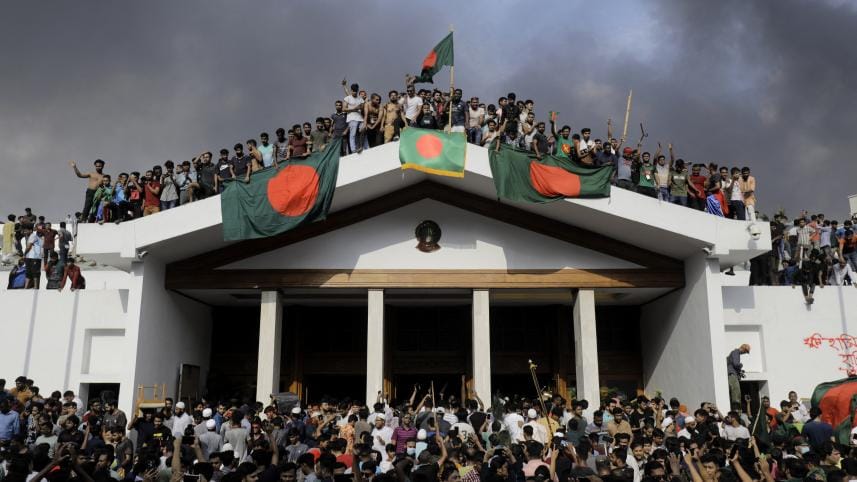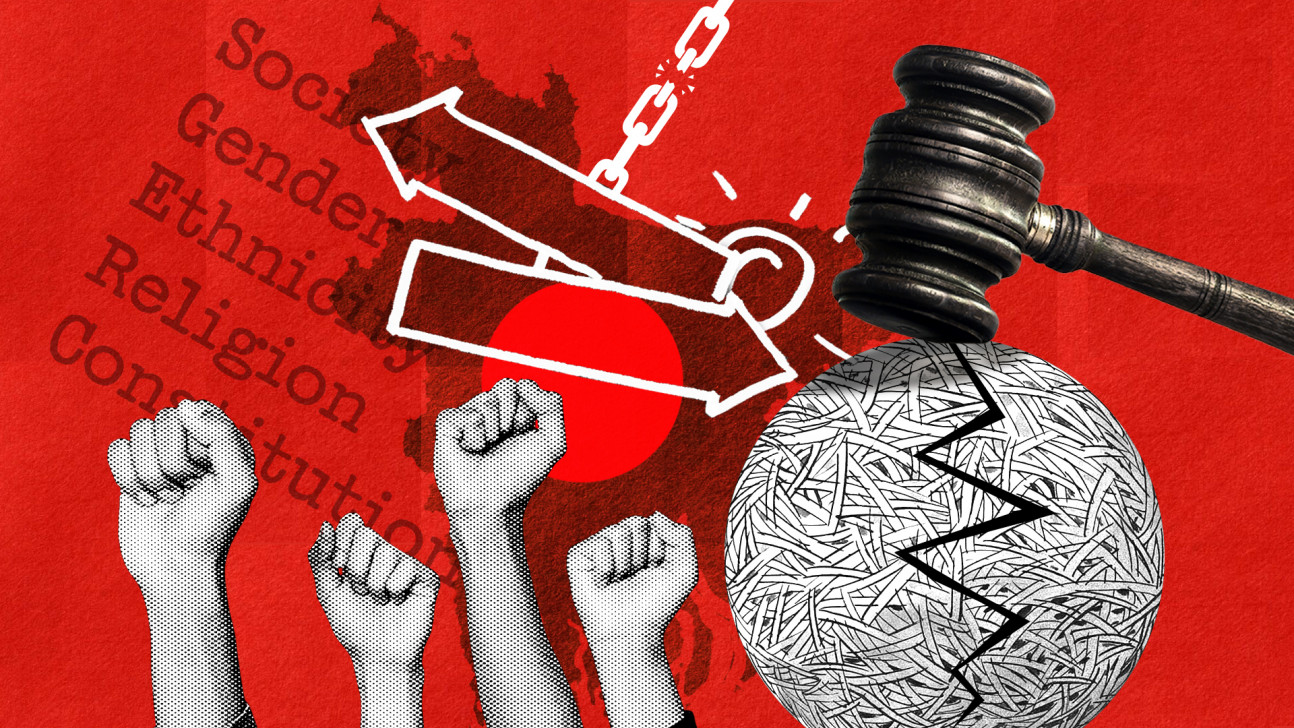Are we looking at a second republic or a fourth?

The Jatiya Nagorik Party (National Citizen Party, NCP), driven by the momentum of the anti-discrimination student movement and the Jatiya Nagorik Committee, recently proposed the establishment of what they call a "second republic" in Bangladesh. This bold declaration has reignited debate over the country's constitutional trajectory and evolving governance. At its core, the proposal seeks to redefine the state structure by reconstructing the constitution, ostensibly to prevent future authoritarian rule. But framing this moment as the "birth" of a second republic overlooks the deeper and more complex reality of the country's political evolution. Bangladesh is not on the verge of a second republic—it is transitioning into its fourth. Recognising this distinction is not just a matter of historical accuracy but is essential for understanding the true nature of the transformation underway.
In a discussion published by Prothom Alo English on March 1, 2025, Ariful Islam Adib, senior joint convener of NCP, elaborated on what the party envisions by a second republic. He said their vision seeks to unify the people's historical struggles into a single political moment, one that demands an entirely new constitutional order. "The first republic," he asserts, "was the independence we gained through our great Liberation War. The constitution formulated after the War had some structural flaws, which made the government and prime ministers authoritarian and fascist." By calling for a "second republic," Adib and his party advocate for breaking away from this flawed system to prevent the monopolisation of power and ensure lasting democratic stability.
This frustration with past governance failures is valid. Over the years, various groups in Bangladesh, including civil society organisations, opposition parties and, notably, student-led movements have consistently advocated for structural reforms to prevent the return of authoritarian rule. The idea of a second republic reflects a broader aspiration for a decisive break from systemic failures, rather than a series of incremental reforms. However, this framing overlooks the fact that Bangladesh has already undergone multiple political and constitutional transformations, each representing a distinct "republican" phase by promoting the sovereignty of the people in deciding their body of representatives. Consequently, defining a republic as anything beyond substantial constitutional reforms aimed at securing popular sovereignty and addressing systemic failures could risk plunging the country into a reign of terror, potentially unmanageable in our current context.
The concept of a second republic draws inspiration from countries that have undergone fundamental constitutional overhauls, most notably France and Spain. France, for instance, established its first republic in 1792 following the fall of the monarchy, only for it to collapse in 1804. The second republic (1848-1852) emerged after another revolution but was short-lived, giving way to further republics over time. Each transition marked a radical restructuring of governance, legally and institutionally. Applying this framework to Bangladesh shows that the country already transitioned through three distinct republics before the mass uprising in July-August 2024, each marked by significant shifts in governance, national identity, and political structure, pointing towards popular sovereignty, which is a mark of the "republican" phase.
Bangladesh's first republic began with its independence in 1971 and the adoption of the 1972 constitution, which sought to establish a democratic, secular, socialist and nationalist state. This represented a significant effort to redefine the state structure in alignment with the ideals of popular sovereignty post-independence. It was an era of idealism as the new nation aimed to rebuild from the destruction of war. However, governance quickly became centralised. Political instability, economic struggles, and the shift to a one-party system under BAKSAL in 1975 led to growing authoritarian control. The assassination of Sheikh Mujibur Rahman on August 15, 1975, marked the violent end of this phase.
The second republic emerged following the military coup of November 7, 1975, bringing military-backed rule under Ziaur Rahman and later HM Ershad. This period saw an ideological shift as Zia moved away from Bangalee nationalism and introduced "Bangladeshi nationalism." In 1977, Zia removed secularism from the constitution, rehabilitated Islamic political groups, and promoted privatisation over state-controlled socialism. Although marked by military dominance, the reinstatement of a multi-party system in 1979 can be seen as an attempt to reintroduce some degree of popular participation in governance. Zia's assassination in 1981 triggered further instability, culminating in Ershad's authoritarian rule, which cemented military dominance in politics. Despite holding elections, governance remained under the military's influence. It was not until 1990, when mass protests forced Ershad to resign, that Bangladesh transitioned back to civilian rule.
The third republic began with the fall of Ershad on December 6, 1990, marking the return to civilian governance under alternating leadership of the Awami League and BNP. At the outset of this phase, the enactment of a caretaker government system to oversee free and fair elections was seen as an attempt to ensure popular sovereignty. However, both the major parties later amended the constitution to consolidate power rather than strengthen democracy. By the time of the 2014, 2018, and 2024 elections, each widely criticised for irregularities, Bangladesh drifted further into authoritarianism, characterised by the centralisation of power, suppression of opposition, and erosion of democratic institutions under Sheikh Hasina's prolonged rule.
The success of the student-led mass uprising in July-August 2024, which led to the ouster of Sheikh Hasina on August 5, marks a decisive break from the trajectory of "Hasinocratic" authoritarianism. Bangladesh is now entering its fourth republic, not as a mere extension of the past but as a structural overhaul of the state and its constitution to prevent authoritarianism from resurfacing. This moment is critical as the country seeks to dismantle the entrenched centralisation of power that defined the Hasina era. The goal is to establish governance that is more transparent, accountable, and resistant to single-party domination, thereby moving closer to the republican ideals of popular sovereignty and systemic reform.
However, this transition must be approached without distorting history, as previous regimes have done to justify their rule. The NCP must uphold historical accuracy in its framing of the republics. The Awami League was heavily criticised for manipulating history to serve its political agenda, and any new political force must avoid the same appropriation of history. Whether one advocates for a second republic or a fourth, the fundamental goal must be to preserve historical integrity rather than rewrite history for political convenience. Understanding Bangladesh's evolution as a progression through distinct republics is crucial to ensuring that the lessons of the past inform the future.
The road ahead remains uncertain, but one fact is clear. Historical truth must not be sacrificed in the pursuit of political change. Bangladesh is entering its fourth republic, and recognising this reality is the first step towards fostering a genuinely democratic future. A steadfast commitment to truth and transparency will be essential in shaping a republic that not only learns from past mistakes but also lays the foundation for a truly democratic and accountable state.
Dr Kazi ASM Nurul Huda is associate professor of philosophy at the University of Dhaka and adjunct faculty at North South University (NSU). He can be reached at huda@du.ac.bd.
Views expressed in this article are the author's own.
Follow The Daily Star Opinion on Facebook for the latest opinions, commentaries and analyses by experts and professionals. To contribute your article or letter to The Daily Star Opinion, see our guidelines for submission.




 For all latest news, follow The Daily Star's Google News channel.
For all latest news, follow The Daily Star's Google News channel. 


Comments